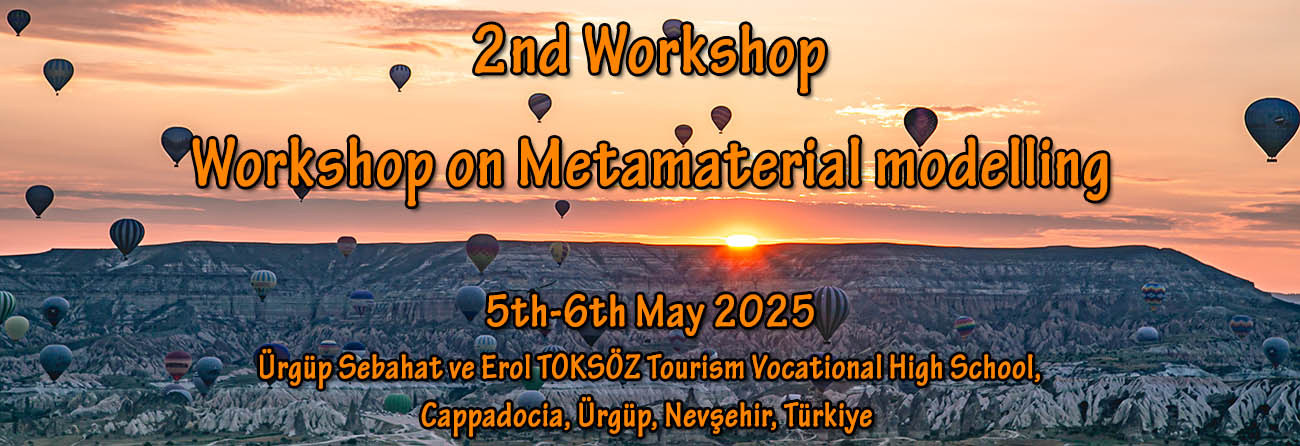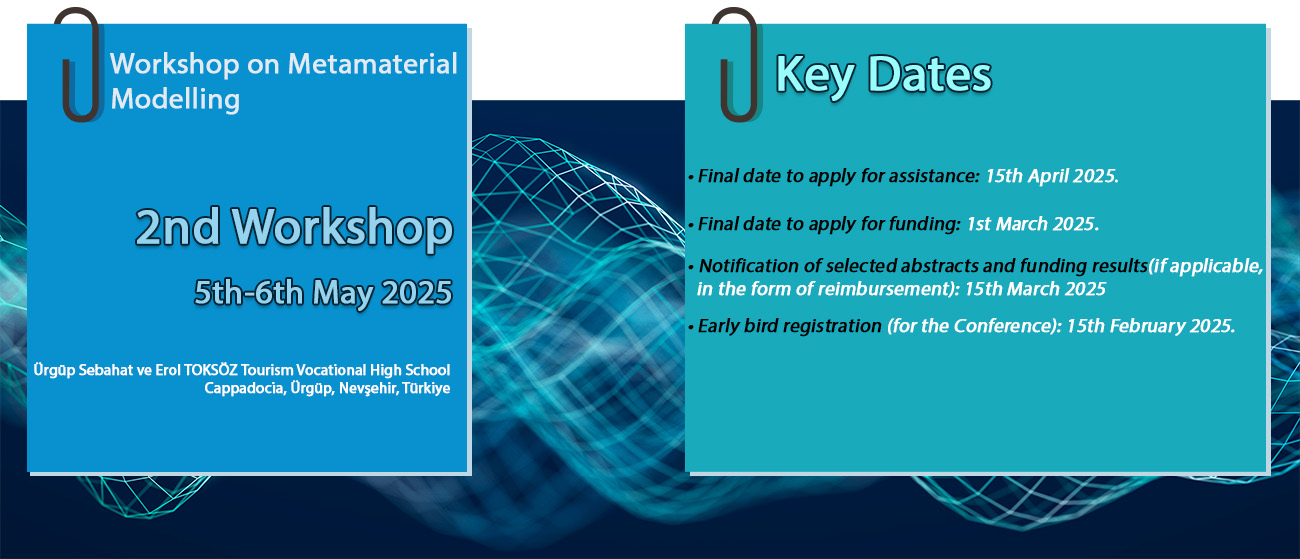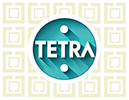2nd Workshop


Registration
Airports and Workshop locations
Recommended Accommodation Options:
Ürgüp Sebahat and Erol Toksöz Tourism Vocational School
Uset Hotel (Nevşehir Hacı Bektaş Veli University Practice Hotel)
Cappadocia Marriott Hotel
Perissia Hotel
Mustafa Cappadocia Resort
Workshop Program:

The online access link for the hybrid-format workshop is provided below.
Online Access Link
COST Action
COST Action CA23125 TETRA aims to create a European network to share information, facilitating technology and knowledge transfer between the academic and health sectors, related to cancer studies. TETRA also aims to establish the material formalism approach as a standardized and accepted method for the detection of cancer without the need for human intervention. The Action will explore novel approaches for studying the metamaterial properties of biological tissues to accurately identify healthy and cancerous areas.
Accordingly, the 2nd workshop in the frame of Working group 2, which coordinates the “Workshop on Metamaterial modelling”, is focused on dissemination of WG2 results in a community important for metamaterial Technologies, promotion for WG2, input for the metamaterial society. Three groups of people are brought together in this workshop: mathematicians who are studying homogenization in high contrast materials and who are contributing to a better understanding of the mathematics of metamaterials; physicists and engineers who are working on metamaterials and their applications; and numerical analysts who are interested in solving the macroscopic and microscopic equations governing the behavior of metamaterials. There are still a number of obstacles to overcome, including gaining a deeper comprehension of the new behaviors and uses that metamaterials can accomplish in real-world settings; investigating the theoretical possibilities of homogenization theory; and developing effective and precise numerical algorithms to solve partial differential equations in order to advance the field. WG1 meeting aims to conclude on the visualization of cancerous tissues using established and emerging imaging modalities. During the WG2 meeting methods for digitizing and homogenizing biological tissues will be discussed. It is planned to conclude on the best options that could be applied. WG3 will conclude on the optimal techniques for measuring the properties of biological tissues for optimization of metamaterial-based modelling.
Accordingly, the 2nd workshop in the frame of Working group 2, which coordinates the “Workshop on Metamaterial modelling”, is focused on dissemination of WG2 results in a community important for metamaterial Technologies, promotion for WG2, input for the metamaterial society. Three groups of people are brought together in this workshop: mathematicians who are studying homogenization in high contrast materials and who are contributing to a better understanding of the mathematics of metamaterials; physicists and engineers who are working on metamaterials and their applications; and numerical analysts who are interested in solving the macroscopic and microscopic equations governing the behavior of metamaterials. There are still a number of obstacles to overcome, including gaining a deeper comprehension of the new behaviors and uses that metamaterials can accomplish in real-world settings; investigating the theoretical possibilities of homogenization theory; and developing effective and precise numerical algorithms to solve partial differential equations in order to advance the field. WG1 meeting aims to conclude on the visualization of cancerous tissues using established and emerging imaging modalities. During the WG2 meeting methods for digitizing and homogenizing biological tissues will be discussed. It is planned to conclude on the best options that could be applied. WG3 will conclude on the optimal techniques for measuring the properties of biological tissues for optimization of metamaterial-based modelling.
COST is an intergovernmental framework for European Cooperation in Science and Technology established to initiate networking and coordination of nationally funded research activities on a European level. It facilitates bringing good scientists together under light strategic guidance based on networks, called COST Actions, centred around research projects in fields that are of interest to COST countries and cooperating countries.
PRESENTATION
This is a call for participating at the 2nd Workshops in the frame of WGs 2 of the COST action (CA23125) – TETRA.
-
2nd Workshop (WG2), 5-6 May 2025, Cappadocia-Türkiye– “Workshop on metamaterial modelling”
Organizing committee 2nd Workshop: Dr. Prof Władimir Mitiuszew (Working Group 2 Leader), Grant Awarding Coordinator (Dr Miklos Veres), head of the local organizing committee (Dr. Muharrem Karaaslan, Dr. Mehmet Bakır),Prof. Dr. Tatjana Gric (Chair), Prof. Dr. Edik Rafailov (Vice Chair), Dr Pablo Loza-Alvarez (WG1 Leader), Dr Giannis Zacharakis (WG3 Leader) in the frame of WG 2: Mathematical modelling of highly disordered anisotropic structures of the COST action (CA23125) –TETRA. -
Celebration date: 5th May 2025, Cappadocia, Türkiye
Location: The workshop will be celebrated at the Ürgüp Sebahat ve Erol Toksöz Tourism Vocational High School Otel- Fatih Mahallesi 12.Cad. No:9 ÜRGÜP / NEVŞEHİR, TÜRKİYE - Registration: Third Workshop – Registration
- Final date to submit abstracts: 15th April 2025 (Download Template)
- Communication, confirmation and funding (if applicable in the form of reimbursement): 15th March 2025.
- Early bird registration: 15th February 2025.
- Workshop date: 5-6th May 2025.
SCOPE
TETRA aims to create a European network to share information, facilitating technology and knowledge transfer between the academic and health sectors, related to cancer studies.
TETRA also aims to establish the material formalism approach as a standardized and accepted method for the detection of cancer without the need for human intervention. The Action will explore novel approaches for studying the metamaterial properties of biological tissues to accurately identify healthy and cancerous areas. Besides, TETRA also aims to establish a common definition of the metamaterial formalism approach,Increase the engagement of young researchers in knowledge sharing and networking activities.
Three groups of people are brought together in this workshop: mathematicians who are studying homogenization in high contrast materials and who are contributing to a better understanding of the mathematics of metamaterials; physicists and engineers who are working on metamaterials and their applications; and numerical analysts who are interested in solving the macroscopic and microscopic equations governing the behavior of metamaterials. There are still a number of obstacles to overcome, including gaining a deeper comprehension of the new behaviors and uses that metamaterials can accomplish in real-world settings; investigating the theoretical possibilities of homogenization theory; and developing effective and precise numerical algorithms to solve partial differential equations in order to advance the field. In this meeting, methods for digitizing and homogenizing biological tissues will be discussed. It is planned to conclude on the best options that could be applied.
Accordingly, the workshop is focused on two main sessions:
TETRA also aims to establish the material formalism approach as a standardized and accepted method for the detection of cancer without the need for human intervention. The Action will explore novel approaches for studying the metamaterial properties of biological tissues to accurately identify healthy and cancerous areas. Besides, TETRA also aims to establish a common definition of the metamaterial formalism approach,Increase the engagement of young researchers in knowledge sharing and networking activities.
Three groups of people are brought together in this workshop: mathematicians who are studying homogenization in high contrast materials and who are contributing to a better understanding of the mathematics of metamaterials; physicists and engineers who are working on metamaterials and their applications; and numerical analysts who are interested in solving the macroscopic and microscopic equations governing the behavior of metamaterials. There are still a number of obstacles to overcome, including gaining a deeper comprehension of the new behaviors and uses that metamaterials can accomplish in real-world settings; investigating the theoretical possibilities of homogenization theory; and developing effective and precise numerical algorithms to solve partial differential equations in order to advance the field. In this meeting, methods for digitizing and homogenizing biological tissues will be discussed. It is planned to conclude on the best options that could be applied.
Accordingly, the workshop is focused on two main sessions:
- First session: Optimising methodologies for experimental visualisation of biomedical tissues
- Second session: Mathematical modelling of highly disordered anisotropic structures
- Third session: Determining the biological properties of highly disordered materials
2nd Workshop-Workshop on Metamaterial modelling
Call for participating
This is a call for participating in the 2nd Workshop (WG2), 5-6 May 2025, Cappadocia-Türkiye– “Workshop on Metamaterial modelling”
Organizing committee 2nd Workshop: Dr. Prof Władimir Mitiuszew (Working Group 2 Leader), Grant Awarding Coordinator (Dr Miklos Veres), head of the local organizing committee (Dr. Muharrem Karaaslan, Dr. Mehmet Bakır),Prof. Dr. Tatjana Gric (Chair), Prof. Dr. Edik Rafailov (Vice Chair), Dr Pablo Loza-Alvarez (WG1 Leader), Dr Giannis Zacharakis (WG3 Leader)
Key dates
We invite abstract contributions for oral presentations to this interdisciplinary workshop from all academic disciplines (PhD students, young researchers, post-doctoral and senior researchers, and professors) and other stakeholders, that address the following issues of the two main sessions:
Organizing committee 2nd Workshop: Dr. Prof Władimir Mitiuszew (Working Group 2 Leader), Grant Awarding Coordinator (Dr Miklos Veres), head of the local organizing committee (Dr. Muharrem Karaaslan, Dr. Mehmet Bakır),Prof. Dr. Tatjana Gric (Chair), Prof. Dr. Edik Rafailov (Vice Chair), Dr Pablo Loza-Alvarez (WG1 Leader), Dr Giannis Zacharakis (WG3 Leader)
Key dates
- Final date to apply for assistance: 15th April 2025.
- Communication, confirmation and funding (if applicable in the form of reimbursement): 1st March 2025.
- Notification of selected abstracts and funding results (if applicable, in the form of reimbursement): 15th March 2025
-
Early bird registration (for the Conference): 15th February 2025.
We invite participations to this interdisciplinary workshop from all academic disciplines (PhD student, young researchers, post-doctoral and senior researchers, professors) and other stakeholders. Contributors and attendees could apply for financial support (see financial support section).
We invite abstract contributions for oral presentations to this interdisciplinary workshop from all academic disciplines (PhD students, young researchers, post-doctoral and senior researchers, and professors) and other stakeholders, that address the following issues of the two main sessions:
-
1. Optimising methodologies for experimental visualisation of biomedical tissues
- 1.1. Visualisation of cancerous tissue using established and emerging imaging modalities/techniques.
- 1.2. Development of image processing and segmentation techniques and compare with existing image analysis protocols.
- 1.3. Classification and annotation of images.
-
2. Mathematical modelling of highly disordered anisotropic structures
- 2.1. Developing methods for digitizing and homogenizing biological tissue.
- 2.2. Developing methods for effective permittivity extraction.
- 2.3. Creation of classification algorithms.
-
3. Determining the biological properties of highly disordered materials
- 3.1. Development of techniques for measuring the properties of biological tissues for optimization of metamaterial-based modelling.
- 3.2. Investigation of the impact of the disorder on reflection and transmission properties within biological tissue.
- 3.3. Validation of TETRA models' capacity to discriminate between biological tissues.
Rules for abstract submission
Abstracts should have a maximum of 350 words (download the Abstract Template).
Contributors could apply for financial support (see financial support section).
Contributors could apply for financial support (see financial support section).
Financial Support – Application procedure for reimbursement
Documentation for applying
The documentation needed for applying for reimbursement are as follows:
The documentation needed for applying for reimbursement are as follows:
- 1. Applicants must upload a short Curriculum Vitae (in English).
- 2. Applicants must upload a motivation letter (in English).
- 3. Applicants must upload a scanned copy of their passport (if applicants do not have a passport, they can upload their national ID card).
Financial Support – Application procedure for reimbursement
The documentation needed for applying for reimbursement are as follows:
- 1. Applicants must upload a short Curriculum Vitae (in English).
- 2. Applicants must upload a motivation letter (in English).
- 3. Applicants must upload a scanned copy of their passport (if applicants do not have a passport, they can upload their national ID card).
The selection criteria for participants that will be eligible for reimbursement will comply with the COST Excellence and Inclusiveness Policy, in the implementation of the Action. They will encourage attendance by a diverse selection of participants in consideration of:
- 1. Underrepresented groups, including those with disabilities. Priority will be given to underrepresented groups, including those with disabilities.
- 2. Gender balance.
- 3. The level of involvement of Inclusiveness Target Countries (ITCs). Priority will be given to participants from Inclusiveness Target Countries. The current list of ITCs include Albania, Armenia, Bosnia and Herzegovina, Bulgaria, Cyprus, Czech Republic, Estonia, Croatia, Georgia, Greece, Lithuania, Latvia, Malta, Moldova, Montenegro, Poland, Portugal, Romania, Slovenia, Slovakia, Republic of North Macedonia, Republic of Serbia, Turkey and Ukraine.
- 4. The level of involvement of Early Career Investigators (ECIs). Priority will be given to PhD students and young post-doctoral researchers, followed by senior post-doctoral researchers and professors.
-
5. In addition, workshop organizers may also consider other special attributes such as:
- 5.1. Type, or level of expertise in the field of the Workshop based on the curriculum vitae,
- 5.2. Appropriate core knowledge and understanding
- 5.3. Willingness to participate based on the motivation letter
- 5.4. Demonstrated interest based on the motivation letter,
- 5.5. The positive impact that the participants will have on the applicant’s future carrier and
- 5.6. Willingness to make a presentation in the Workshop session.
Financial support through reimbursement does not necessarily cover all expenses but is a contribution to the overall travel, accommodation and meal expenses.
The financial contribution for each successful applicant shall respect the following criteria:
The financial contribution for each successful applicant shall respect the following criteria:
- Up to a maximum of EUR 650 in total can be afforded to each successful applicant from ITC country.
- Up to a maximum of EUR 450 in total can be afforded to each successful applicant from non-ITC country.
- Up to a maximum of EUR 150 in total can be afforded to each successful applicant from Tü rkiye (distances > 100km from the Workshop Venue).
Evaluation process and result announcement
The selection committee, composed of the Action Chair, the Vice Chair, the Grant Awarding coordinator, and the WG1, WG2 and WG3 leaders and co-leaders, will evaluate the applications within a month after the abstract submission deadline and will inform the successful evaluated applicants. The successful applicants will then receive an e-mail from the grant holder (Grant Letter Notification), stating the official approval of the reimbursement, the granted budget, and a payment request form which has to be completed after the completion of the Workshop.
If the amount of reimbursement by all applications within a call does not exceed the available budget, the applications are handled by the selection committee. If there are more applications than funding is available, the following procedure takes place.
- 1. A list of all applications (containing an informative summary) is distributed to all members of the selection committee in form of a table in which every evaluator can mark which applications he or she can evaluate according to their field of expertise.
- 2. To guarantee a fair and objective evaluation, an evaluator should have no affiliation with neither the home nor the host institution of the application in question.
- 3. All applications are evaluated by two members of the selection committee. The Grant Awarding coordinator distributes the proposals to the individual evaluators.
-
4. The criteria given in the table below shall be applied for evaluation. The first criterion (a) is assessed by the Grant Awarding coordinator prior to the evaluation process.
Criterion max. points a) Before any further criteria are considered Application is complete and fulfils all formal requirements pass/no pass The application will be ranked last if the applicant was granted in previous call pass/no pass b) Evaluation of the proposal Applicant from ITC country 0 or 10 Applicant is ECI (or promotes gender balance) 0 or 10 Impact on the career of the applicant 15 Willingness to participate based on the motivation letter 10 Willingness to make a presentation in the Workshop session 10 CV of the applicant 10 Relevance to the objectives of TETRA Action 20 - 5. The evaluators report their evaluations to the Grant Awarding coordinator.
- 6. The Grant Awarding coordinator ranks all evaluations and then reports the final result to the selection committee to be discussed and accepted.
- 7. The applicants are informed about the decision reached.
More information
- Website COST Action
- Online application form
- COST Annotated Rules
- Dr. Mehmet Bakır – Local Organizer (Bozok University)
- Dr. Miklos Veres, Grant Awarding Coordinator
- Dr. Tatjana Gric – Chair
- Dr. Edik Rafailov – Vice-Chair
- Dr. Muharrem Karaaslan – Local Organizer (ISTE)
- Dr. Erkan Tetik – Local Organizer (Usak University)
- Prof Władimir Mitiuszew (Working Group 2 Leader)


COST (European Cooperation in
Science and Technology) is a funding
agency for research and innovation
networks. Our Actions help connect
research initiatives across Europe and
enable scientists to grow their ideas
by sharing them with their peers. This
boosts their research, career and
innovation.
www.cost.eu
www.cost.eu